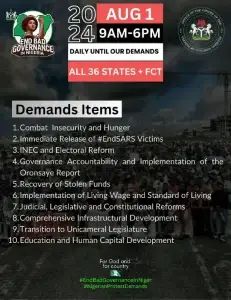
#EndBadGovernance: Full Demands Ahead Of August 1 Peaceful Protest

Organisers of the nationwide #EndBadGovernance protests scheduled to start on August 1 have listed their demands from the federal government. The group warned that “if one protester is killed, maimed, or arrested, we will not leave the streets until Tinubu and his entire cabinet step down.”
The demands are focused on “issues that the federal government exclusively manages,” a document shared with West Africa Weekly stated.

Combat Insecurity and Hunger: Food and security are at the top of the list of demands from the federal government. The protesters want Nigerian borders, forests, and farming communities to be more secure. They also demand an end to police brutality and a police reform programme starting with a “nationwide transparent recruitment process to admit at least 100,000 top graduates into our police colleges to push closer to the United Nations (UN) recommended police-population ratio.” They made a similar demand for the military, including returning all military personnel to the barracks and borders.
In addition, they are demanding investment in intelligence and surveillance technologies to monitor and prevent criminal activities; the provision of financial and logistical support and compensation to farmers and communities affected by insecurity; an immediate ban on GMO seeds and foods in Nigeria; and the provision of credits and modern farming equipment to farmers.
Immediate Release of #EndSARS Victims. The group wants the government to “publish a comprehensive list of all #EndSARS detainees, including their names, locations of detention, and the charges against them, if any”. The group demand an end to arbitrary arrests and detentions, as well as independent and transparent investigations into the arrests and treatment of #EndSARS protesters.
INEC and Electoral Reform: The third demand borders on electoral reforms. The protesters demand a panel of inquiry to probe the Independent National Electoral Commission (INEC) regarding the 2023 presidential election, which was marred by irregularities and violence. They also demanded the removal of Dr Anugbum Onuoha as the Resident Electoral Commissioner (REC) and any other RECs appointed with issues relating to conflict of interest. In addition, they demand an amendment of Nigeria’s Electoral Act to include improvement in the use of technology, diaspora voting, exclusion of politicians from INEC contracts and employments, and the creation of an Electoral Offences Commission to investigate and prosecute electoral offences.
Other demands under electoral reforms include “constitutional amendments that would insulate INEC from the political influences of the executive arm of government in terms of its composition and funding, power to appoint the INEC board (including the INEC chairman) should be transferred from the president to the National Judicial Council (NJC), and election petition should have a 30 days time limit.” An elected person should not assume office before the end of a tribunal case.
Governance Accountability and Implementation of the Oronsaye Report:
In addition to the full implementation of the Oransaye report, the group demanded that all public officeholders’ salaries, allowances, and benefits be made public. It demanded a slash in the cost of governance by 50 per cent, a reduction “in the allowances and perks provided to House of Representatives members to align more closely with the economic realities of the country,” and the removal of zonal intervention projects from the oversight of the National Assembly. It argued that the ZIPs, or constituency projects, should be transferred to local government councils “for better supervision and implementation.”
Recovery of Stolen Funds:
The protesters demand the recovery of all stolen funds within and outside the country. They want the government to implement legal reforms to strengthen the mechanisms for tracking and recovering stolen funds and to ensure stringent penalties for corruption-related offences. In addition, they seek a five-year jail term for anyone guilty of stealing funds exceeding N1 million and the death penalty for funds exceeding N20 million.
“We call for the publication of detailed reports on the amounts recovered, the sources of these funds, and the individuals or entities from whom these funds have been recovered. Establish an independent oversight committee, including members of civil society, to monitor the recovery process and ensure accountability. Allocate recovered funds to specific public welfare projects, such as education, healthcare, and infrastructure development, ensuring that these funds directly benefit the citizens.”
Implementation of Living Wage and Standard of Living: The group demands a minimum monthly wage of N300,000 so “all workers can afford necessities such as food, housing, healthcare, and education.” It also seeks an enforcement policy to ensure all public and private employers comply with minimum wage payments. It also demands an immediate fuel price reduction to N100 per litre “by utilising savings from operating fully functional local refineries, where crude oil is supplied to these refineries at a subsidised rate, rather than through direct fuel subsidies.”
In addition, the group asked the federal government to improve access to affordable healthcare services for all citizens regardless of their financial status and set up comprehensive social safety net programs to support unemployed, underemployed, and vulnerable populations by providing financial assistance and job training programs; subsidies on essential food items and support for local agriculture to reduce food costs; and ensure the full payment of all outstanding pension arrears to retirees.
Judicial, Legislative, and Constitutional Reforms:
The organisers demand a comprehensive review of the Nigerian Constitution to address current socio-political and economic challenges; a transparent system to record and publish the votes of all members of the National Assembly on every bill and legislative motion; amendment of the Constitution to decentralise power and grant more autonomy to states and local governments; and the institutionalisation of public participation in the legislative processes, “allowing citizens to contribute to the drafting and review of laws and policies.”
They also seek reforms that require members of the National Assembly to consult with their constituents before voting on major bills, separate the roles of the Chief Justice of Nigeria (CJN) and the head of the NJC, and establish an independent oversight body to monitor NJC activities. They ask the government to “broaden NJC membership to include diverse legal, academia, and civil society representatives. Mandate decisions to be made by consensus or supermajority vote, and require the NJC to publish detailed reports of its decisions.”
In addition, they demand the implementation of strong whistleblower protections and ethics training for NJC members, mandating all public office holders only to utilise federal medical centres within Nigeria, prohibiting them from foreign healthcare trips, and mandating all public office holders to enrol their children in public educational institutions within Nigeria, from primary to tertiary level.
Comprehensive Infrastructural Development:
The group demands the revitalisation of all local oil refineries to their full capacity. It also asked the government to immediately set up a committee to build at least ten thousand housing units for current IDP camp settlers and resettle them into these housing units once completed and close all IDP camps, and ensure consistent and reliable electricity supply by investing in diverse energy sources, upgrading power grids, and promoting renewable energy projects.
Also, the protesters want the government to “guarantee access to clean and safe drinking water and improve sanitation facilities, particularly in rural and underserved urban areas.” They also want the government to build, upgrade, and maintain healthcare facilities nationwide, invest in the construction and maintenance of educational infrastructure, and develop agricultural infrastructure, such as irrigation systems, storage facilities, and transportation networks, to boost food security.
Transition to Unicameral Legislature:
The group demands the initiation of a constitutional review process to transition to a unicameral legislature to streamline decision-making, reduce bureaucratic delays, and ensure quicker implementation of policies. It also demands that savings from a reduced legislative budget be redirected toward essential services such as healthcare, education, and infrastructure development.
Education and Human Capital Development: The last demand on the list is for the government to ensure that all children, regardless of their socio-economic status, have access to free and quality education from primary to secondary levels and to provide grants for tertiary education.
They also ask that the government invest in teachers’ training to improve education quality, implement and expand vocational and technical training programs to equip youth and adults with marketable skills and provide scholarships, mentorship programs, and entrepreneurship training. “Additionally, we call for free education in STEM fields and agricultural studies. Establish state-of-the-art Federal Medical Centres (FMCs) in each senatorial district, ensuring they are equipped with the necessary advanced medical equipment, including but not limited to MRI machines, CT scanners, digital X-ray systems, ultrasound machines, ventilators, and fully equipped surgical suites.”
Read More:
- Nigerian Spinter Favour Ofili Denied 100m Entry at Paris 2024 Olympics Due to AFN, NOC Errors
- Iheanacho To Join Sevilla FC in Permanent Transfer Deal
About The Author
Related Articles
AES Condemns Niamey Airport Attack, Warns of Coordinated Destabilisation
The Alliance of Sahel States has strongly condemned the armed attack on...
ByWest Africa WeeklyFebruary 2, 2026Mali Cedes Strategic Land to Guinea to Deepen Trade Cooperation
Mali has approved the transfer of a strategic parcel of land to...
ByWest Africa WeeklyFebruary 2, 2026Senegal to Appeal CAF Sanctions After AFCON Final Controversy
Senegal has announced plans to formally appeal the sanctions imposed by the...
ByWest Africa WeeklyFebruary 2, 2026Burkina Faso Takes Legal Step Toward Nuclear Energy Development
Burkina Faso has voted to join the Vienna Convention on Civil Liability...
ByWest Africa WeeklyFebruary 2, 2026











